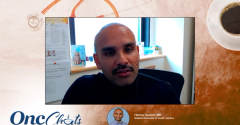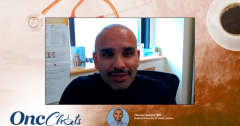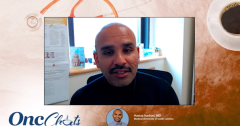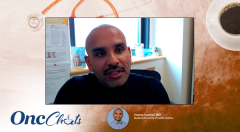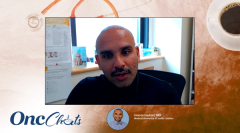
Unpacking Data From Pivotal Trials in Multiple Myeloma: Exploring Key Takeaways from the DETERMINATION Trial
In this fifth episode of OncChats: Unpacking Data From Pivotal Trials in Multiple Myeloma, Hamza Hashmi, MD, reviews the implications of up-front vs delayed transplant on survival, quality of life, and risk of secondary malignancies in newly diagnosed, multiple myeloma.
Episodes in this series

In this fifth episode of OncChats: Unpacking Data From Pivotal Trials in Multiple Myeloma, Hamza Hashmi, MD, of the Medical University of South Carolina, reviews the implications of up-front vs delayed transplant on survival, quality of life, and risk of secondary malignancies in newly diagnosed, multiple myeloma.
Finally, I will talk about the DETERMINATION trial [NCT01208662], which was presented at the 2022 ASCO Annual Meeting by Paul Richardson, MD, of Dana-Farber Cancer Institute, and later published in the New England Journal of Medicine. DETERMINATION is a phase 3, randomized, controlled trial comparing up-front vs delayed transplant in patients with newly diagnosed, transplant-eligible multiple myeloma. ‘Up front’ was defined as high-dose chemotherapy [and] autologous transplant after 3 cycles of induction [treatment with] lenalidomide [Revlimid], bortezomib [Velcade], and dexamethasone [RVd]. ‘Delayed transplant’ was defined as transplant that was performed post relapse.
A total of 700 patients were randomized into 2 arms. Arm A received RVd induction followed by high-dose chemotherapy and transplant, followed by 2 cycles of consolidation, followed by lenalidomide maintenance until disease progression or intolerable toxicity. Arm B, the delayed transplant arm, received RVd induction for 3 cycles, followed by stem cell mobilization and collection, followed by 5 more cycles of RVd consolidation, followed by lenalidomide maintenance until disease progression or intolerable toxicity.
At 6 years of follow-up, we learned that patients who underwent up-front transplant after completion of their induction [treatment] had a superior progression-free survival [PFS] of around 66 months vs 48 months for patients who underwent delayed transplant. This trial also looked at patients based on their cytogenetic risk profile, and we learned that the patients who have standard-risk [disease], which is typically 70% to 80% of all myelomas, had a median PFS of close to 84 months or 7 years compared with around 55 months for patients who underwent delayed transplant. Looking at high-risk cytogenetic abnormalities, defined as patients having deletion 17p, translocation 4:14, and translocation 14:16, we learned that up-front transplant associated with significantly superior PFS of close to 55 months vs only 18 months with delayed transplant. Having noticed this improvement in PFS, there is still no difference in overall survival [OS], and perhaps that's related to the follow-up of only 6 years at this time. Maybe with longer follow-up we will see a difference in OS, as well.
In this trial, we saw a clear decline in the patient quality of life [QOL] as they went through transplant, which is related to the adverse effects of high-dose melphalan causing mucositis and myelosuppression, but that transient decline in the QOL improved over a period of time as patients recovered from the transplant. We also learned that patients who undergo high-dose chemotherapy with melphalan followed by transplant and lenalidomide maintenance have a slightly higher incidence of secondary hematologic malignancies, including myelodysplastic syndrome and acute myeloid leukemia. When compared with the IFM 2009 trial [NCT01191060], the sister trial of the DETERMINATION trial, which was done in Europe, we had a very similar trial design and patient population. The major difference was [IFM 2009 explored] maintenance chemotherapy with lenalidomide for only 1 year after transplant. We very clearly saw [in DETERMINATION] that by continuing lenalidomide maintenance until disease progression or intolerability, instead of for only 1 year, after transplant, [there is] an improvement in PFS of close to 2 years.
This clinical trial very clearly established the PFS benefit for newly diagnosed multiple myeloma. It's important to highlight some of the important features of this trial when applying its results to everyday clinical practice. Patients who are above the age of 65 years were not included in the trial, so we haven't seen patients who are in their late 60s or early 70s. We have to bear in mind that patients only grow older and frailer with time, and hence, perhaps the best time to do transplant for them is early on, in the up-front setting. Secondly, it can be sometimes challenging to collect and store stem cells if there is no intent to do transplant within 1 year of the collection of the stem cells. Thirdly, patients with high-risk cytogenetic abnormalities very clearly had a significantly superior benefit with up-front transplant compared with patients who had high-risk disease and underwent delayed transplant. Twenty percent of the patients [in the delayed transplant arm] were not able to undergo transplant [at the time of relapse]. The reasons behind that remain unclear; whether this was due to the patient's comorbidities, age, frailty, or perhaps physician preference, remains unknown. However, it is also an important point to bear in mind when seeing patients who come for transplant consultation.
In my opinion, up-front high-dose chemotherapy and autologous stem cell transplant after adequate duration of induction chemotherapy is the standard of care; it leads to a clear difference in PFS, at the cost of transient decline of QOL and slightly increased risk of secondary malignancies. Again, although there are no OS data, it's important to bear in mind that we have not reached the median follow-up on this trial. As such, perhaps we will even see an OS benefit emerge with longer follow-up on this trial.


